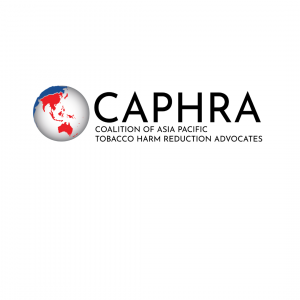CAPHRA Criticises Philippine Government’s Inconsistent Vaping Policies, Calls for Evidence-Based Approach
I remain hopeful that the Philippines will maintain adult access to safer alternatives while ensuring safety and compliance.”
MANILA, PHILIPPINES, April 23, 2025 /EINPresswire.com/ -- The Coalition of Asia Pacific Tobacco Harm Reduction Advocates (CAPHRA) today criticised the Philippine government for its contradictory stance on vaping, highlighting inconsistencies between public crackdowns on illicit vape products, growing fiscal dependence on vape taxes, and questionable environmental practices surrounding the disposal of confiscated devices.“The Department of Health’s punitive approach to vaping stands in stark contrast to the government’s increasing reliance on vape taxes to offset declining cigarette revenues,” said Nancy Loucas, Executive Coordinator of CAPHRA. The Bureau of Internal Revenue (BIR) has openly stated that vape tax collections are crucial to meeting this year’s excise targets, particularly as cigarette tax revenues decline due to reduced smoking rates and rising illicit trade.
Meanwhile, the Bureau of Customs (BOC) recently destroyed nearly three million smuggled vape products, valued at over PHP 3.2 billion, during a high-profile ceremony led by President Ferdinand Marcos Jr. While intended to combat illicit trade, Loucas criticised the destruction, saying, “Destroying vapes without exploring recycling or upcycling options is environmentally irresponsible and disregards best practices successfully adopted by other countries. This is political theatre at the expense of sustainability.”
Loucas also pointed to mixed messaging in public health communication. While Health Secretary Teodoro Herbosa champions strict vaping regulations, the government’s fiscal dependence on vape tax revenues sends conflicting signals to both consumers and industry. “Vilifying vaping while depending on its income undermines the integrity of both public health initiatives and fiscal policy,” she said.
CAPHRA’s research, encompassing over 700 participants, indicates that the majority of ex-smokers credit vaping with their success in quitting cigarettes. However, many remain confused and frustrated by the government’s contradictory approach. “The public demands regulated access to reduced-risk products and expects policies based on scientific evidence, not political expediency,” Loucas added.
Supporting the call for a more balanced approach, harm reduction advocate Justin Tumang stated, “We must move beyond scare tactics and focus on practical solutions that genuinely help people transition away from smoking. Harm reduction is about providing safer alternatives, not punishing those seeking better health outcomes.”
Clarisse Yvette P. Virgino, CAPHRA’s Philippine representative, reinforced the importance of sensible regulation. “As someone who successfully switched from smoking to vaping, I believe in regulation that protects consumers without being so prohibitive that it risks pushing people back to cigarettes or the black market. I remain hopeful that the Philippines will maintain adult access to safer alternatives while ensuring safety and compliance.”
CAPHRA urges Philippine authorities to create a coherent policy framework that recognises vaping’s role in tobacco harm reduction, ensures environmentally responsible disposal of confiscated products, and actively consults independent scientific experts.
“Health policy must evolve beyond political posturing. CAPHRA stands ready to work collaboratively with the government to develop solutions that prioritise public health and environmental stewardship,” Loucas concluded.
N. E. Loucas
Coalition of Asia Pacific Tobacco Harm Reduction Advocates
+64 27 234 8463
email us here
Legal Disclaimer:
EIN Presswire provides this news content "as is" without warranty of any kind. We do not accept any responsibility or liability for the accuracy, content, images, videos, licenses, completeness, legality, or reliability of the information contained in this article. If you have any complaints or copyright issues related to this article, kindly contact the author above.
Pogo Stadium Demo Launches for Steam Next Fest With Go-Inspired Rhythm Strategy and Shinobu Amayake Score
Talentuch Reports Groundbreaking Recruitment Case: Client Chooses AI Over Human Data Analyst
Electra Wins Audience Prize at WMF 2025 for Advancing Battery Intelligence with AI
Kalendarium
Więcej ważnych informacji
 Jedynka Newserii
Jedynka Newserii

 Jedynka Newserii
Jedynka Newserii

Transport

Import materiałów budowlanych z Rosji zagrożeniem dla konkurencyjności europejskiego rynku. Konieczne są zmiany i egzekwowanie sankcji
Unia Europejska powinna zrewidować politykę celną na import materiałów budowlanych spoza państw członkowskich, w tym państw wschodnich – twierdzą uczestnicy konferencji „Bezpieczeństwo gospodarcze UE”. Obecnie Wspólnota nakłada na europejskich producentów coraz więcej ograniczeń, nie rewidując polityki celnej, co przekłada się na systematyczne osłabienie konkurencyjności przedsiębiorstw, spadek produkcji i zagrożenie dla miejsc pracy.
Konsument
Polacy odczuwają brak wiedzy na temat inwestowania. Może to sprzyjać podejmowaniu nieracjonalnych decyzji finansowych

Co trzeci Polak odczuwa brak wiedzy w obszarze inwestowania, a tylko co piąty chciałby pogłębić swoją wiedzę na ten temat – wynika z badania „Poziom wiedzy finansowej Polaków 2025”. Ci, którzy na własną rękę szukają informacji i porad, coraz częściej sięgają do blogów, portali, podcastów i wideo w internecie. Eksperci przestrzegają, że finansowych i inwestycyjnych porad udzielają nie tylko specjaliści w danej dziedzinie, więc potrzebna jest zasada ograniczonego zaufania.
Handel
Do 2030 roku liczba plastikowych opakowań w e-handlu modowym może się podwoić. Ich udział najszybciej rośnie w Polsce

Wraz ze wzrostem kanału e-commerce w branży modowej rośnie liczba wykorzystywanych opakowań, z których znaczną część wciąż stanowią te z plastiku. Do 2030 roku w Polsce e-sprzedawcy zużyją 147 mln plastikowych opakowań – wynika z badania przeprowadzonego na zlecenie DS Smith. Można zauważyć rosnący trend wśród marek modowych, które coraz częściej wybierają opakowania wykonane z papieru lub materiałów z recyklingu. To o tyle istotne, że polscy konsumenci odczuwają wyrzuty sumienia z powodu ilości plastiku, w którym dostarczane są ich zamówienia.
Partner serwisu
Szkolenia

Akademia Newserii
Akademia Newserii to projekt, w ramach którego najlepsi polscy dziennikarze biznesowi, giełdowi oraz lifestylowi, a także szkoleniowcy z wieloletnim doświadczeniem dzielą się swoją wiedzą nt. pracy z mediami.










.gif)

 |
| |
| |
|